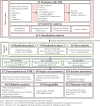Integrating plasma protein-centric multi-omics to identify potential therapeutic targets for pancreatic cancer
- PMID: 38858729
- PMCID: PMC11165868
- DOI: 10.1186/s12967-024-05363-9
Integrating plasma protein-centric multi-omics to identify potential therapeutic targets for pancreatic cancer
Abstract
Background: Deciphering the role of plasma proteins in pancreatic cancer (PC) susceptibility can aid in identifying novel targets for diagnosis and treatment.
Methods: We examined the relationship between genetically determined levels of plasma proteins and PC through a systemic proteome-wide Mendelian randomization (MR) analysis utilizing cis-pQTLs from multiple centers. Rigorous sensitivity analyses, colocalization, reverse MR, replications with varying instrumental variable selections and additional datasets, as well as subsequent meta-analysis, were utilized to confirm the robustness of significant findings. The causative effect of corresponding protein-coding genes' expression and their expression pattern in single-cell types were then investigated. Enrichment analysis, between-protein interaction and causation, knock-out mice models, and mediation analysis with established PC risk factors were applied to indicate the pathogenetic pathways. These candidate targets were ultimately prioritized upon druggability and potential side effects predicted by a phenome-wide MR.
Results: Twenty-one PC-related circulating proteins were identified in the exploratory phase with no evidence for horizontal pleiotropy or reverse causation. Of these, 11 were confirmed in a meta-analysis integrating external validations. The causality at a transcription level was repeated for neutrophil elastase, hydroxyacylglutathione hydrolase, lipase member N, protein disulfide-isomerase A5, xyloside xylosyltransferase 1. The carbohydrate sulfotransferase 11 and histo-blood group ABO system transferase exhibited high-support genetic colocalization evidence and were found to affect PC carcinogenesis partially through modulating body mass index and type 2 diabetes, respectively. Approved drugs have been established for eight candidate targets, which could potentially be repurposed for PC therapies. The phenome-wide investigation revealed 12 proteins associated with 51 non-PC traits, and interference on protein disulfide-isomerase A5 and cystatin-D would increase the risk of other malignancies.
Conclusions: By employing comprehensive methodologies, this study demonstrated a genetic predisposition linking 21 circulating proteins to PC risk. Our findings shed new light on the PC etiology and highlighted potential targets as priorities for future efforts in early diagnosis and therapeutic strategies of PC.
Keywords: Mendelian randomization; Pancreatic cancer; Plasma proteome; Therapeutic target.
© 2024. The Author(s).
Conflict of interest statement
None.
Figures




References
MeSH terms
Substances
Grants and funding
LinkOut - more resources
Full Text Sources
Medical

